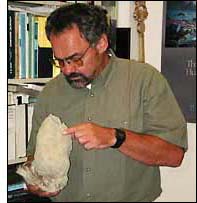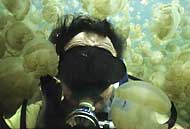|
|
||
|
| ||
|
 The history of ancient life fascinates Dr. Jere Lipps, in particular the origin of marine animals. He employs a combination of field and molecular biology techniques to examine many aspects of reef biology and microscopic organisms called foraminifera. An avid diver, Lipps spends much of his time in the field collecting animals and observing ecological interactions in reef habitats. In the laboratory, he uses DNA sequences and fossil specimens to explore the evolutionary relationships among protists and animals. The history of ancient life fascinates Dr. Jere Lipps, in particular the origin of marine animals. He employs a combination of field and molecular biology techniques to examine many aspects of reef biology and microscopic organisms called foraminifera. An avid diver, Lipps spends much of his time in the field collecting animals and observing ecological interactions in reef habitats. In the laboratory, he uses DNA sequences and fossil specimens to explore the evolutionary relationships among protists and animals.
For Lipps, paleontology doesn’t feel like a job. He truly loves his work, and cannot imagine doing anything else for a living. In addition to satisfying his own intellectual curiosity, however, Lipps sees other reasons why his work is worthwhile. The public has always been curious about the origin of animal life, and Lipps’s research on marine organisms contributes to the understanding of how animals evolved. As Lipps puts it, paleontologists capture the spotlight because of the public’s fascination with dinosaurs and the Earth’s ancient history. Economic and social reasons add to the importance of Lipps’s work. If environmental groups understand the historical underpinnings of the habitat they are battling to preserve or restore, they can better direct costly conservation efforts. Geology and paleontology can help such groups to understand natural cycles that take place in a particular habitat. In addition, oil companies regularly consult with geologists to guide their search for oil deposits. For example, early in his career Lipps collected and analyzed microfossils for two different companies. |
|
| Browse the Interview: Profile | Research | Teaching & outreach | Path to UCMP | ||
| Home | What’s new | About UCMP | History of life | Fossil collections | Other resources | ||
